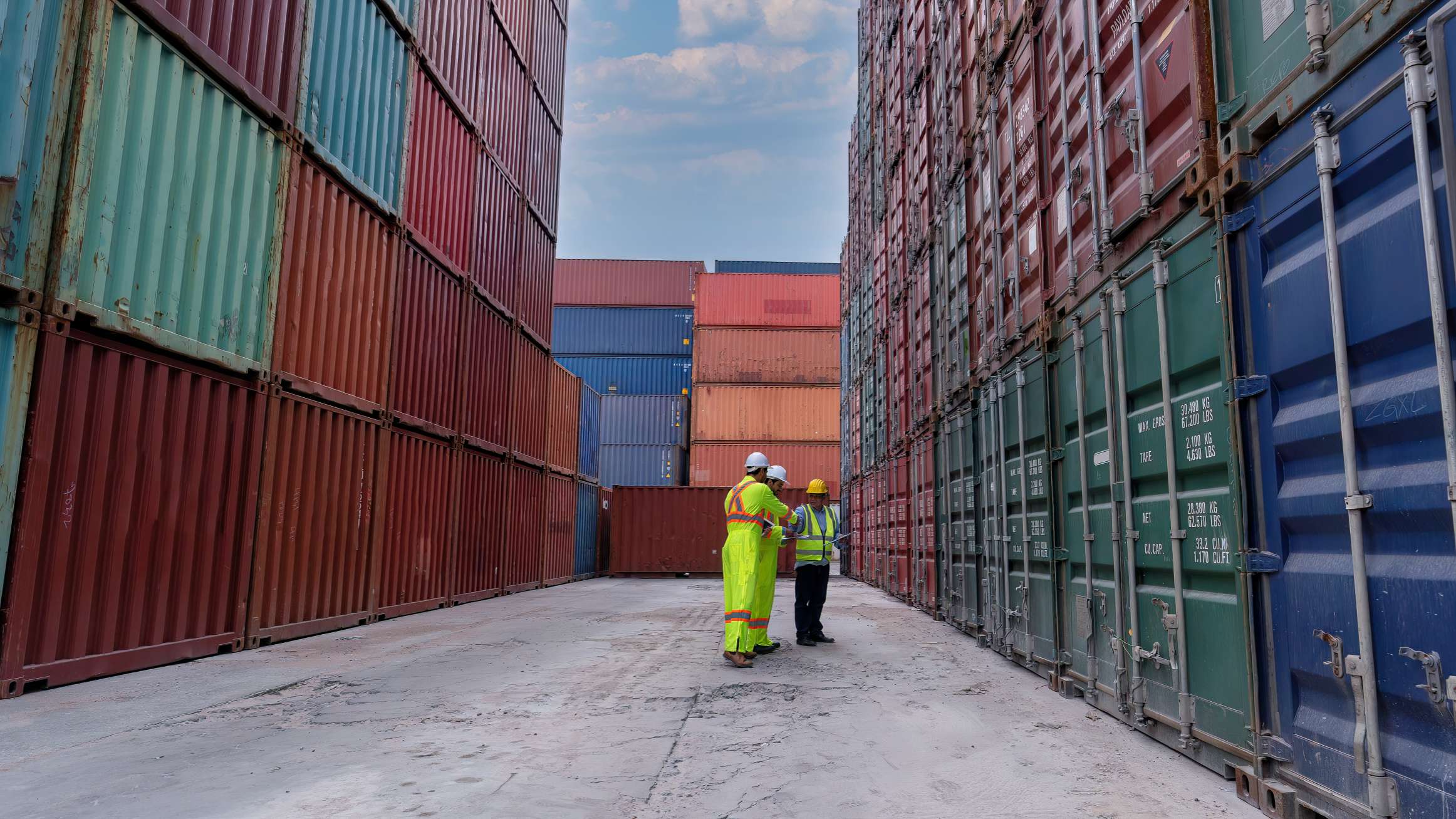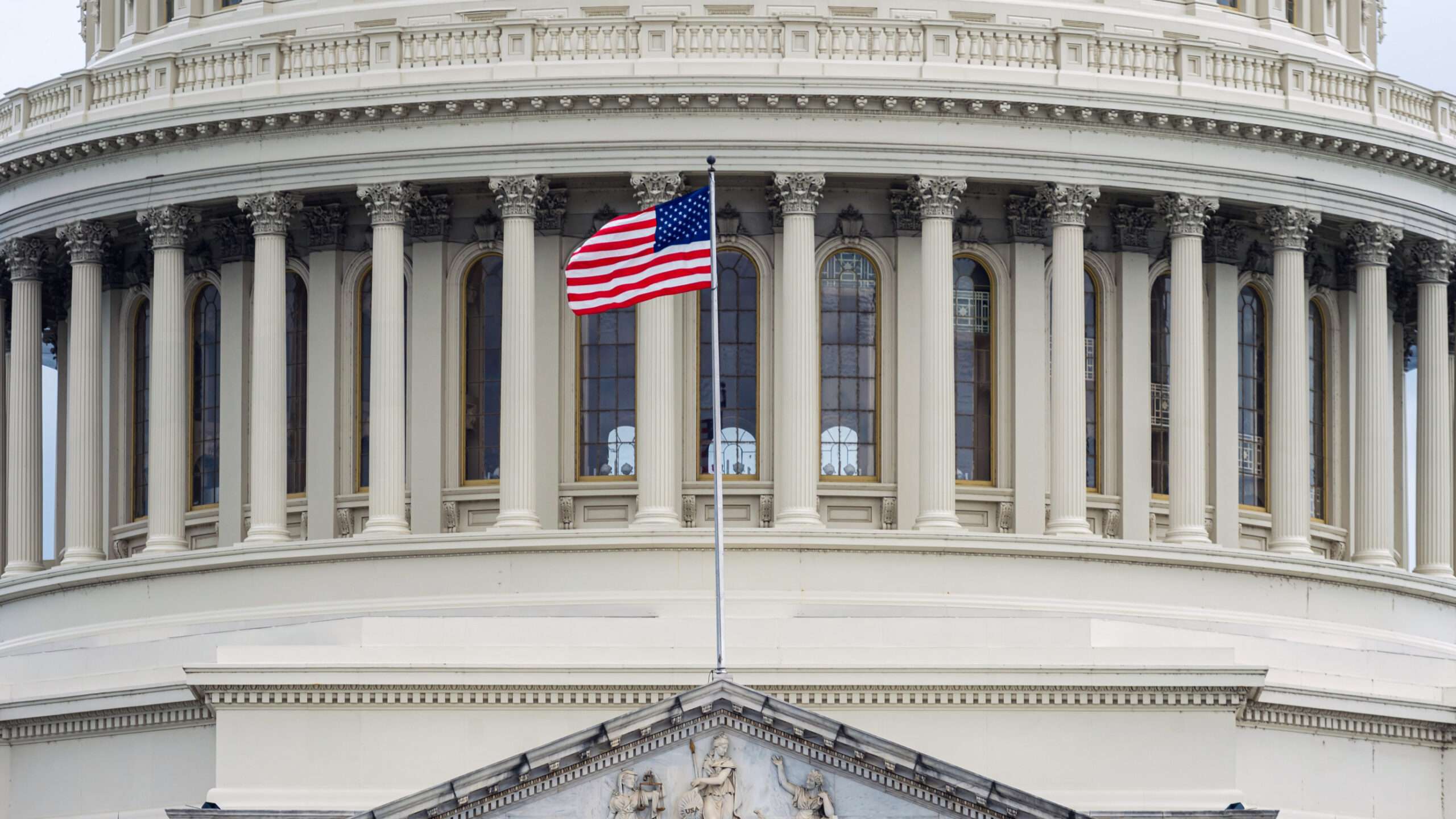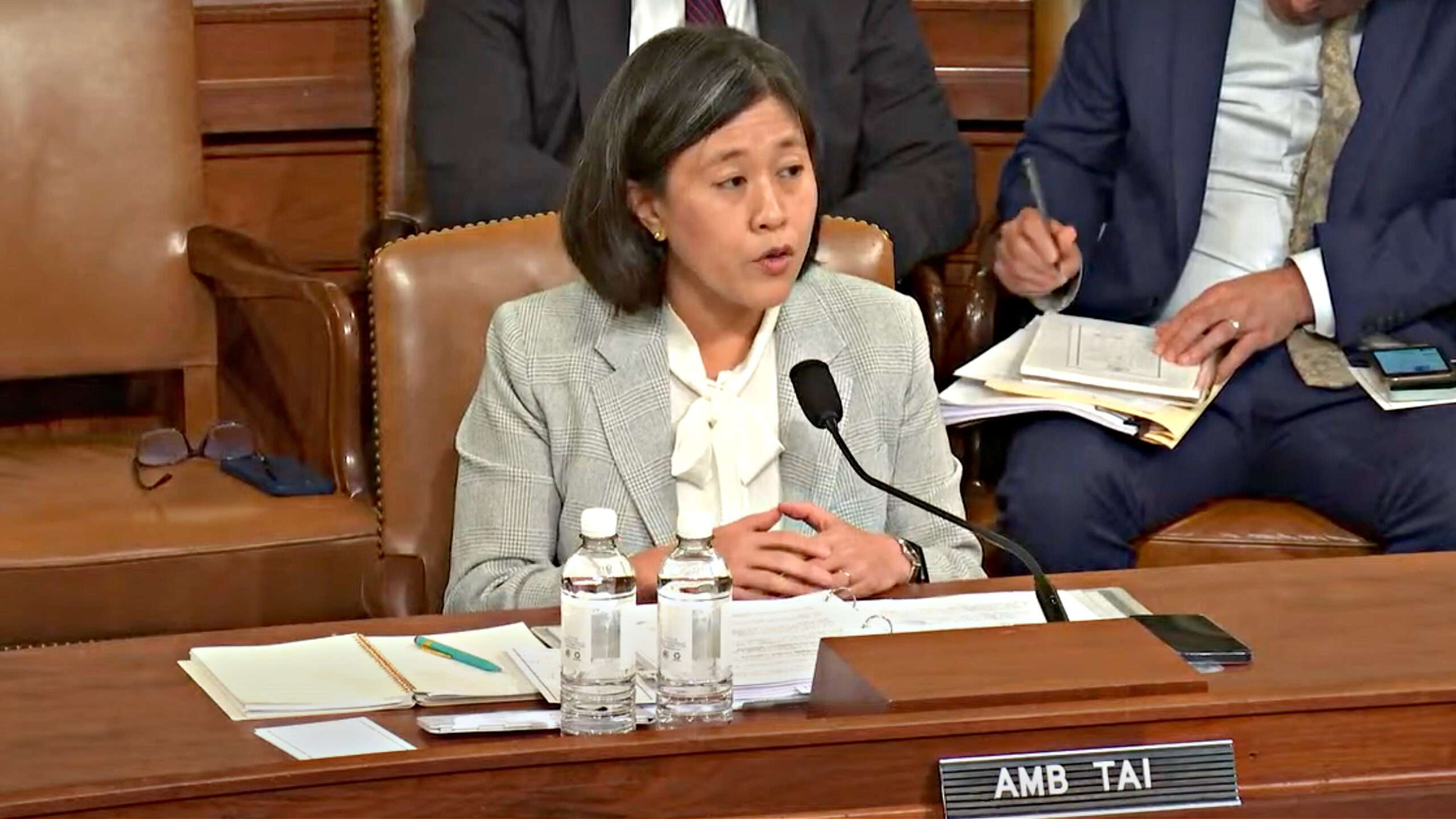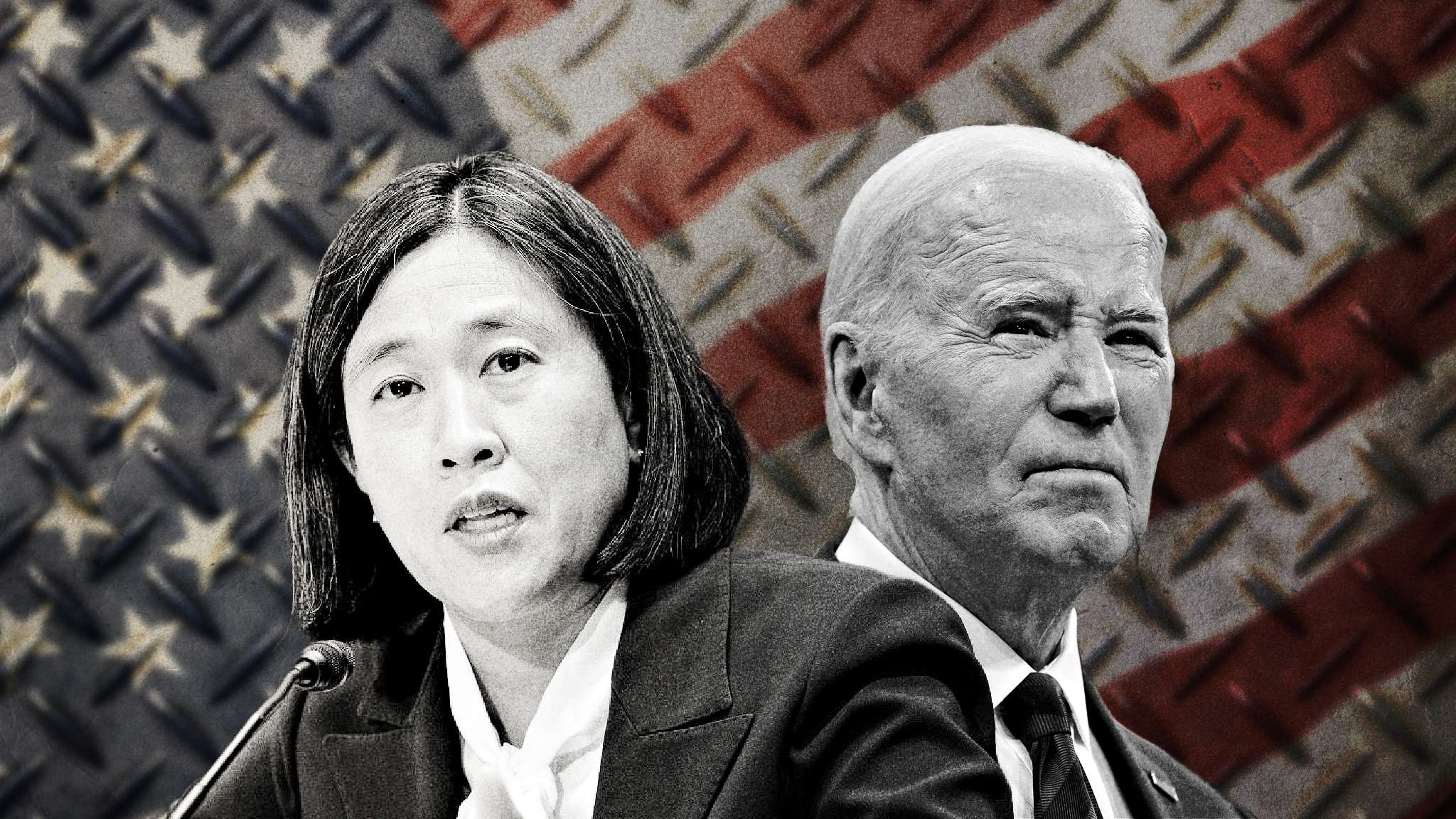The following written testimony was submitted to the Congressional-Executive Commission China (CECC) on April 18, 2023 by CPA’s Robby Stephany Saunders, Vice President for National Security, and Charles Benoit, Trade Counsel.
Before the Congressional-Executive Commission on China
WRITTEN TESTIMONY
Tuesday, April 18, 2023 at 10:00am ET | Submitted on Tuesday, April 18, 2023
Submitted by: Robby Stephany Saunders, Vice President for National Security and Charles Benoit, Trade Counsel, Coalition for a Prosperous America
INTRODUCTION
The Coalition for a Prosperous America (CPA) thanks the Commission for holding this hearing on the Uyghur Forced Labor Prevention Act (UFLPA) and its impact on global supply chains. We believe it is important oversight to examine the law’s impact and continue exploring how to eliminate forced labor in multinational supply chains. CPA is a nonprofit, bipartisan organization representing the interests of domestic producers in manufacturing and agriculture across the country. of 4.1 million households engaged in domestic production through our agricultural, manufacturing and labor members.
Our written testimony will focus on two key areas: trade and investment. Regarding trade, we elaborate on the law enforcement gaps and the need to close the de minimis loophole in U.S. customs policy. For investment, we outline the importance of stopping the financing behind the companies that make the products. Products do not make themselves; companies make the products. These products are made by forced labor because of the companies involved that benefit from the government regime in the People’s Republic of China (PRC) and the ability of these Chinese Communist Party (CCP) linked companies to raise hundreds of billions of dollars for their companies. It is morally wrong and illegal for these companies to benefit from forced labor and it is also morally wrong for financiers to back these companies. It is also then nearly impossible to compete in the global marketplace with companies that profit off of slave labor and receive minimal to no actual punishment for their actions – while continuing to receive international financial backing from the world’s most lucrative capital markets – those of the United States and the Western world.
TRADE
China will not allow the policing of its supply chains, rendering a law enforcement approach futile.
The Chinese Communist Party (CCP) has made it abundantly clear, through both legal and extra-legal means, that they will not tolerate investigations into forced labor in China. Therefore, the legal requirements of Section 307 of the Tariff Act of 1930, not to mention our moral duty to fight forced labor, will be nullified by attempting to narrowly target particular consignments of merchandise from specific entities.
This is not conjecture. The U.S. Department of State, in a statement to the Wall Street Journal, reported that “We are deeply concerned by reports that supply chain auditors have been detained, threatened, harassed, and subjected to constant surveillance while conducting their vital work in China”. China[1] has called allegations of forced labor in state-run labor programs involving Uyghurs “the lie of the century[2]”.
If a class of merchandise originating in China is made in part with forced labor, then Withhold Release Orders should apply against the entire relevant class(es) of merchandise originating in China. This is already authorized by law, and done for smaller countries.
Fortunately, existing law and practice offers an easy remedy to the CCP’s adversarial stance on policing supply chains. Per existing regulations in 19 C.F.R. §§ 12.42 – 12.45, when U.S. Customs & Border Protection (CBP) is presented with information that indicates that merchandise was produced using forced labor, CBP is permitted to issue a Withhold Release Order against all shipments of that class of merchandise for the offending country of origin.
CBP has already done this in other countries. On May 18, 2018, following a petition filed by members of the U.S. Cotton Campaign, Alternative Turkmenistan News, and International Labor Rights Forum, CBP issued a Withhold Release Order against “All Turkmenistan Cotton or products produced in whole or in part with Turkmenistan cotton.” The order[3] does not contemplate any futile attempt to parse particular shipments of Turkmenistan cotton depending on supply chain records. It is enough to know that the Turkmenistan government is tolerating forced labor in cotton, and until that situation is resolved, no shipments of Turkmenistan cotton may be entered into the United States.
Given that ongoing forced labor abuses assuredly involve complicit support from the territory’s sovereign, making Withhold Release Orders country-wide is the appropriate response. It is also the only functional response given the data elements CBP has to work with. Every shipment must indicate a country of origin of the merchandise, as well as a classification under the Harmonized Tariff System for a formal shipment. This makes prohibiting the importation of goods made in part with forced labor relatively straightforward, when the Withhold Release Order is tied to a class of merchandise and a country of origin.
If there were situations where particular foreign producers of a product were affected unfairly as they did not rely on forced labor, then existing practice already authorizes the appropriate approach. On November 1, 2019, CBP issued a Withhold Release Order against tobacco produced in Malawi and products containing tobacco produced in Malawi. This is the best way to start. Since then, three business entities have had themselves removed from the order, presumably demonstrating to the CBP Commissioner’s satisfaction that their particular shipments did not constitute forced labor. This is precisely the type of rebuttal presumption required by Section 3 of the Uyghur Forced Labor Prevention Act.
Finally, if issuing Withhold Release Orders tied to a class of merchandise and a country of origin is deemed ‘too much’ given the size of China’s economy, then we should be honest about that fact.
De Minimis
Currently, there is no attempt to enforce forced labor Withhold Release Orders against merchandise entering through Section 321 of the Tariff Act of 1930, known as ‘de minimis shipments’. Even the most basic data, like merchandise country of origin, is typically lacking for de minimis shipments. De minimis imports are done by ‘consignees’, typically mail carriers or express couriers, who cannot speak to the package beyond what is written on the manifest. The manifest description in turn may be as simple as one or two words. CBP is clear when pressed by legislators: there is no policing of de minimis or application of UFLPA to the de minimis channel, which accounts for over two million shipments per day. Failing to repeal de minims signals an unwillingness to tackle forced labor seriously.
De minimis was codified in 1938 to ensure that the government was not wasting time doing customs assessments on trivial imports. The law set thresholds of $5 for merchandise accompanying travelers and bonafide gifts, and $1 for every other situation. Each threshold is dealt with in a separate subsection.
In 1978, the “everything else” subsection rose from $1 to $5. But in 1994, Congress increased it from $5 to $200 along with the other sections. All of the Congressional record at that time indicated Congress only understood the law as increasing the returning traveler exemption.
Worse yet, via regulation, Treasury unilaterally broke with hundreds of years of customs law, saying that any mail carrier or express courier (‘consignee’) could make entry of merchandise entering via Section 321. This was a profound repudiation of the expectation in customs law that the importer be able to answer questions about the merchandise to a customs officer. This meant individuals and entities making imports had title to their merchandise, and were either present before a customs officer or engaged a customs broker.
Repealing this requirement for de minimis shipments gave every retailer in the world direct access to American homes. We receive millions of these shipments daily, and have little information for the majority of them.
All a foreign vendor has to do to claim de minimis treatment is assert that the value of the shipment, in their country, is worth less than $800. Foreign vendors are able to hand-write these declarations completely outside our jurisdiction, and 99.9% of them will necessarily be accepted at face value, as our customs authorities have no capacity to inspect thousands of mail-box sized shipments per shipping container. Toys can’t be tested for lead. Apparel can’t be checked for forced labor cotton. All of our product safety rules go out the window if the foreign vendor merely asserts de minimis.
Sure enough, 62.5% of de minimis shipments originate from China and Hong Kong. The second largest shipment origination country is Canada. It is safe to assume that the majority of these shipments are not ‘Made-in-Canada’ merchandise. Instead, they certainly consist of mostly Made-in-China merchandise, sitting in bonded warehouses in Canada along the U.S. border, waiting to be delivered within 48 hours of a customer making a purchase online. This is civilizational suicide, and it must end.
While de minimis is growing rapidly, it likely still accounts for less than 3% of merchandise imports, and thus there is still time to repeal it without systemic effects. Other nations have rejected following us down this folly.
INVESTMENT
Americans are complicit in the financing of the forced labor atrocities this hearing is constructed to address and that the UFLPA is supposed to mitigate. But U.S. law and the UFLPA Entity List fails to punish corporate human rights abusers and those companies that take advantage of forced labor schemes. While products are seized, companies go on without being aggressively punished and without losing access to troves of capital available in the U.S. We believe that this should be addressed to maximize the true effectiveness of the UFLPA. In 2020, U.S. holdings of Chinese securities neared $1.2 trillion. This is about five times the holdings than that of any other country. The exposure of U.S. investments in Chinese securities has never been greater, and it will continue to grow. Due to the gaps in U.S. securities laws and those laws intended for due-diligence, investor protection, or risk mitigation, there is no mechanism to prohibit investment in the companies that are profiting off of forced labor and complicit in other human rights violations or posing a risk to American national security.
Below are some of the key areas of risk and the actions Congress can take to minimize the outflowing capital going to support the forced labor regime and the CCP.
A Shares and Passive Investments
Congress, the media, and independent regulators like the Securities and Exchange Commission (SEC) have recently focused on the risks posed to U.S. investors from Chinese companies directly listed on U.S. stock exchanges. While CPA welcomes this focus and encourages further action, it does not address the bulk of “bad actor” Chinese companies that are still present in American passive investment products. Their presence is in the form of over 4,200 A-share and H-share companies found throughout a multitude of financial vehicles, such as Exchange Traded Funds (ETFs) and index mutual funds, that have received little or no regulatory scrutiny or fiduciary due diligence. Tens of millions of Americans are unwittingly exposed to these A-shares in their investment portfolios and retirement investment accounts.
U.S. investors are inadvertently subsidizing Chinese companies involved in activities that are contrary to the national security, economic security, and foreign policy interests of the United States. We are also subsidizing the economic growth of the United States’ top global adversary. A-shares are securities listed on mainland Chinese exchanges and only accessible to American and foreign investors via inclusion in indexes and associated index funds. Similarly, H-shares are Hong-Kong listed shares. These companies are oftentimes non-compliant with U.S. securities laws and financial reporting norms and, in some cases, have been sanctioned by the U.S. Government for egregious human rights and national security abuses.
Index providers neglect to consider the full range of China-specific material risks to investors when determining index constituents and weighting. These include considerations of reputational risks relating to national security, export controls and sanctions regimes, human rights violations, political factors, or even full consideration of traditional environmental, social, and governance (ESG) factors.
As of June 2022, a look at five of the larger index mutual funds offered by industry leaders—Fidelity Emerging Markets Index Fund (FPADX), State Street Emerging Markets Equity Index Fund (SSKEX), BlackRock iShares MSCI Total International Index Fund (BDOKX), Vanguard Emerging Markets Stock Index Fund (VEMAX), DFA Emerging Markets Core Equity I (DFCEX), which just so happen to be included in the new Mutual Fund Window available to TSP beneficiaries—includes at least 14 underlying companies directly linked to China’s military-industrial complex and listed on either the Department of Defense’s Section 1260H list or the Treasury Department’s NS-CMIC List or both, in just these five funds. This is in addition to several companies on BIS’s Entity List and others with documented links to the oppressive Chinese surveillance state and connected to Uyghur forced labor.
Harmonizing Government Sanctions — How to Guide Investors Away from Bad Actor Chinese Companies including forced labor human rights violators
Capital markets sanctions are a relatively under-utilized yet highly effective tool to be brought to bear to force divestment from certain key sectors and bad actor companies in the best interests of investors, human rights, market transparency and accountability, and national security. These sanctions work when properly implemented and are an under-utilized tool of the U.S. Government that this Committee must work to establish and enforce legislatively. Especially for those interested in not going to an actual kinetic / physical war with China, cutting off China’s resources – our capital flowing to them – now and decreasing our dependence on their exports decreases China’s resources and wealth to then be able to ratchet up its pressure on Taiwan and to play in other key geopolitical sandboxes around the world.
Polling conducted by CPA shows an overwhelming majority of Americans are concerned with investment in risky Chinese companies and support stricter investment requirements. A poll conducted by Morning Consult shows Sixty-two percent of voters are concerned Americans can invest in Chinese and Russian companies that have been sanctioned by the U.S. government or have not complied with U.S. laws.
To accomplish this mission of decreasing and divesting U.S. capital from China, a series of executive orders have been promulgated by both Republican and Democratic presidents to try to selectively enforce capital investment bans on critical Chinese companies in critical industries and linked to the CCP military and military-civil fusion operations.
CPA would like to see this concept of capital markets sanctions be expanded to include more human rights violations, including those complicit in or profiting off of forced labor.
When expanding to cover forced labor companies, any new policy must also include the concept of sanctions harmonization. Better than a mere notion of sanctions reciprocity, sanctions harmonization links up current lists run by various U.S. Government Departments and Agencies in an interlocking process such that being sanctioned or listed by one enables the other to undertake consideration for legal sanctions action as well, and ultimately will ideally lead to increased listings by OFAC and more rigorous review. The current U.S. Government arrangement sees little transparency on why some Chinese companies are chosen to be on one list but not another. Across the U.S. Government, there are dozens of reports, lists, advisories, or sanctions tranches issued on a recurring basis. Some of these include: the U.S. Commerce Department’s Bureau of Industry and Security (BIS) Entity List; the Military End User List, the Unverified List, the Department of Defense’s 1260H or CMC List (formerly 1237 CCMC List), the new Uyghur Forced Labor Prevention Act Entity List maintained by Department of Homeland Security, the OFAC NS-CMIC List, and more.
The financial industry will not lead. Congress – supported by the human rights community – must do so. To ensure against further American investment flowing to Chinese companies that pose investor protection, national security, and human rights concerns, Congress should take the following actions:
- Pass legislation that requires index providers and asset managers to address the risks posed by A-share and H-share companies in investment products that have zero investor protection, due-diligence, or disclosures.
- Pass a “Uyghur Forced Labor Divestment Act” to prohibit investment in companies complicit in forced labor activities and punish those intentionally supporting such heinous endeavors
- Expand the Holding Foreign Companies Accountable Act (HFCAA) to cover Chinese companies traded in the United States via passive investment products, despite not being directly listed on U.S. exchanges, to ensure that ETF products traded on U.S. exchanges are PCAOB compliant, consistent with the investor protection imperatives of the Act.
- Compel the SEC to require further disclosures and issue new rules for index providers as it pertains to oversight of quality control and minimizing conflicts of interest.
- Compel the SEC and other U.S. Government agencies to provide and require more information to be made known to investors and fiduciaries in regard to the geographic location of companies, their industries or sectors, their linkages to foreign governments or foreign actors, the presence of companies on U.S. sanctions lists, or other national security, human rights, or governmental and political risk factors.
- Require index providers to reevaluate their index inclusion criteria, which currently expose U.S. investors to material and reputational China-specific risks. and further require them to justify continued inclusion of any such risky China-specific investments.
- Harmonize U.S. sanctions policy against Chinese companies in order to close current gaps that exist between different sanctions lists. This will clarify for and assist index managers and investors in compliance and due diligence.
- Establish a new capital markets list from the State Department with sanctions coordination with the Treasury to include Chinese corporate human rights abusers.
- Consider a national policy to prohibit investors from investing – either here or abroad – in companies which have Chinese Communist Party (CCP) cells in their management.
Appendices:
APPENDIX A: op-ed in The Hill
“How Congress can compel global divestment from China’s forced labor”[4]
BY ROBBY STEPHANY SAUNDERS, OPINION CONTRIBUTOR – 03/16/23 6:00 PM ET
When Beijing hosted the 2022 Winter Olympics, the world’s attention finally focused on China’s alarming human rights abuses. Since 2017, more than 1 million Uyghurs and other ethnic minorities have disappeared into a vast network of re-education camps in the far west region of Xinjiang, China. It’s part of what the U.S. State Department has labeled “genocide.” Beijing remains undeterred by U.S. criticism, however, and continues to press many thousands of Uyghurs and other ethnic groups into slave labor.
In December 2021, President Biden signed the Uyghur Forced Labor Prevention Act (UFLPA) to strengthen laws banning forced-labor products from entering the United States. Since then, the U.S. has enjoyed moderate success in seizing banned goods. And Congress has increased appropriations to help U.S Customs and Border Protection (CBP) fully implement the law.
This was a helpful start. But plenty of goods manufactured through China’s slave labor are still entering the United States. In part, that’s due to an obscure section of U.S. customs law – the “de minimis” threshold for consumer imports – that allows contraband Uyghur products to be shipped directly to U.S. buyers.
The current U.S. de minimis threshold is $800. That means any product valued at less than $800 can simply enter the U.S. without tariffs or scrutiny. This loophole has greatly benefited e-commerce vendors such as Amazon, Ali Express and Shein, since it allows goods produced through Uyghur labor to completely bypass border inspections.
Equally concerning is the CBP’s lack of transparency for bills of lading. Companies can request “manifest confidentiality” from the CBP in order to hide their import data from public view. That leaves competitors and public interest groups unable to adequately monitor imports.
A further challenge is that the UFLPA is applied only to “formal entry” shipments valued at $2,500 or more. As a result, imports of lesser value can also avoid federal oversight.
For the UFLPA to be effective, Congress must plug these holes. But there’s still an overarching question: Why are so many popular global brands continuing to invest in China, particularly in Xinjiang, and prop up Beijing’s slave labor?
The Australian Strategic Policy Institute (ASPI) believes Uyghur labor is now tied to at least 82 well-known global brands, including Apple, BMW, Gap, Huawei, Nike, Samsung, Sony and Volkswagen. If U.S. lawmakers want to thoroughly tackle China’s slave labor, they need to formally identify these corporate bad actors and link them to capital markets sanctions.
This is strong medicine. But many of the multinational firms complicit in China’s labor abuse continue to raise funds in U.S. capital markets. That gives Congress leverage, since lawmakers could block them from continuing to access America’s financial markets.
It’s helpful that the UFLPA created an “entities list” of companies sourcing goods through Uyghur forced labor. But this list must be expanded to accurately track the companies still profiting from supply chains with murky roots in Xinjiang.
What matters is hitting these companies in the wallet. Unfortunately, consumer boycotts are hard to organize on a global scale. And customer awareness is also limited because the U.S. doesn’t require country-of-origin labeling for goods sold online.
The answer is to identify the stocks, exchange-traded funds (ETFs) and mutual funds that include businesses tied to China’s forced labor. This is where Congress holds real leverage since robust legislation could mean pulling these equities and investment products from America’s financial markets.
Companies tied to forced labor (as well as the thousands of index funds containing Chinese companies that benefit from forced labor) should have been targets of the UFLPA. To really compel action, they should now face the threat of being excised from America’s capital markets. Such “forced labor divestment” is a necessary, realistic step to compel multinationals to decide whether to keep sourcing from China’s slave labor (and pay the price) or clean house.
U.S. investors don’t want to support China’s repression of Uyghurs in Xinjiang. It’s time for Congress to force the issue by conditioning access to America’s financial markets on ending corporate complicity in China’s egregious human rights abuses.
Robby Stephany Saunders is vice president for national security at the Coalition for a Prosperous America.
APPENDIX B: Addendum. New data from CPA on publicly traded, Chinese-linked companies present in household investment products linked to forced labor
Methodology: The list of 5266 publicly traded companies initially examined companies with publicly reported links or usage of forced labor in China found using open-source research. The companies ultimately selected for the list have reported links and are publicly traded, including mainland-listed stocks issued abroad. All companies listed are linked to oppression of ethnic minorities within Chinese Territories. We determined that a number of these Chinese corporate forced labor offenders are included in popular American indices and investment products benchmarked against these indices.
Disclaimer: This document reflects the CPA’s own conclusions based on inferences drawn from an analysis of public and proprietary sources and is designed for general information to contribute to public discourse on issues of national concern. CPA disclaims, to the fullest extent permitted by applicable law, any and all liability for the accuracy and completeness of the information in this document and for any acts or omissions made based on such information. CPA is not engaged in rendering any form of professional or other advice or services through the publication of this report. No person or entity should rely on the contents of this publication without first obtaining their own professional advice.
[1] Lingling Wei, Eva Xiao, and Trefor Moss, “China Closes U.S. Auditor as Tensions Mount Over Forced Labor Allegations”, WALL ST. JOURNAL, Aug. 19, 2021, available at https://www.wsj.com/articles/china-closes-u-s-auditor-as-tensions-mount-over-forced-labor-allegations-11629390253
[2] Id.
[3] https://www.cbp.gov/trade/forced-labor/withhold-release-orders-and-findings
[4] Website URL: https://thehill.com/opinion/international/3903787-how-congress-can-compel-global-divestment-from-chinas-forced-labor/














